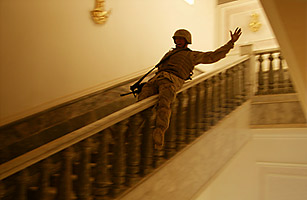
On the afternoon of April 10, 2003, the day after that statue came down in Baghdad's Paradise Square, I made my way to Saddam Hussein's main palace, on the other bank of the Tigris. There had been rumors that the Marines were preparing to blast it to rubble. Instead, I found a small group of Marines combing through the vast complex, looking for documents. A few hundred Iraqis had gathered at the main entrance. In the first flush of freedom from the tyrant, the Americans were heroes. A cheer went up every time a Marine emerged from the palace.
Inside Saddam's gilt- and chintz-filled office, I found a Marine taking down one of the Iraqi flags that hung next to the dictator's desk and asking his Kurdish interpreter to translate the green Arabic lettering that ran through the middle. I'll never know why the Kurd lied, replying, "It says, 'Saddam Hussein.'" (It actually read, "Allahu akbar," or "God is great.") Delighted, the Marine took the flag out to the main portico and brandished it at the crowd of Iraqis. Then he fired up a Zippo lighter and, with a triumphant look, announced, "This is what we'll do to Saddam!"
The Iraqis were aghast. None of them understood English, and all they could see was a lanky, blond American Marine about to burn their national flag. Some of them shouted at the Marine, but he mistook their anger for enthusiasm. "Yeah! We're gonna fry his ass!" he whooped, with an exaggerated, nasal Southern drawl.
My interpreter and I were able — only just — to stop the Marine from setting the flag alight. When we explained what the Arabic lettering really said, he turned pale. "Oh, s___, man, I didn't know," he said, looking nervously at the crowd, which was seething with resentment. "Can you explain that to them?" He thrust the flag into my hands and ran back indoors.
So I found myself holding Saddam's flag and facing an angry Iraqi mob. Luckily, my interpreter had a big voice and was able to make himself heard above the din. He explained that the Marine had not intended any insult and had been misinformed by his interpreter. The Iraqis were mollified. Some made wisecracks about Kurds. I handed the flag to an old man in the crowd. He was dressed like a tribal sheik and had a kindly, weathered face. To my surprise, he gave it back to me. "You saved the flag," he said. "So you should have it."
Know Your Enemy
For years, I've recalled that story as an allegory of ignorance: despite the months of planning for the war with Iraq, U.S. troops had astonishingly little knowledge of the enemy. Their political masters were scarcely better informed. When L. Paul Bremer arrived in Baghdad as the Bush Administration's proconsul, many in his entourage had only a CliffsNotes view of the country. In that first year of the occupation, most of my interactions with officials in the Green Zone — the highly fortified bubble that included Saddam's palace, from which Bremer ruled Iraq — had an upside-down feel. My interviewees had more questions for me than I for them. Some were big-picture questions (What's the difference between Shi'ites and Sunnis?). Others were nuanced (Could people hate Saddam and also hate the Americans who had delivered them from him?).
Ignorance proved increasingly dangerous. At checkpoints, U.S. troops tried to stop cars by holding up an open palm and waving downward. Iraqi drivers interpreted that as "come," not "stop." When a car kept advancing, troops shot warning shots, displaying an unnecessary hostility. Sometimes they'd shoot directly at the car, killing drivers and passengers. It was months before the troops came up with an unambiguous alternative, the outstretched clenched fist — by which time some Iraqis had died for an elementary cultural misunderstanding.
Scarcely better informed, Bremer and his team — and their bosses in Washington — nonetheless presumed to know what was best for Iraq. This led to catastrophic decisions, like the one to dismantle the Iraqi military, which sent tens of thousands of angry, weapons-trained men into the arms of the insurgency. Other institutions were hollowed out when membership in the Baath Party was declared a firing offense. Never mind that many people had joined Saddam's party because it was the only way to get a job. And those young diplomats who didn't know the difference between Shi'ites and Sunnis? Some of them got to decide how those communities would share power.
Ignorance ran both ways. In the months before the war, Iraqis displayed a remarkable lack of understanding about the U.S., the country — and more specifically, the military — that had already inflicted one humiliating defeat on them, in 1991. Saddam's officials predicted that George W. Bush would never give his troops the command to attack. Or if he did, it would be for only a swift punitive expedition followed by an equally fleet withdrawal. After Saddam's fall, leaders of the new insurgency assured me that the Americans didn't have the stomach for a long fight; a few well-aimed blows would send the leviathan home.